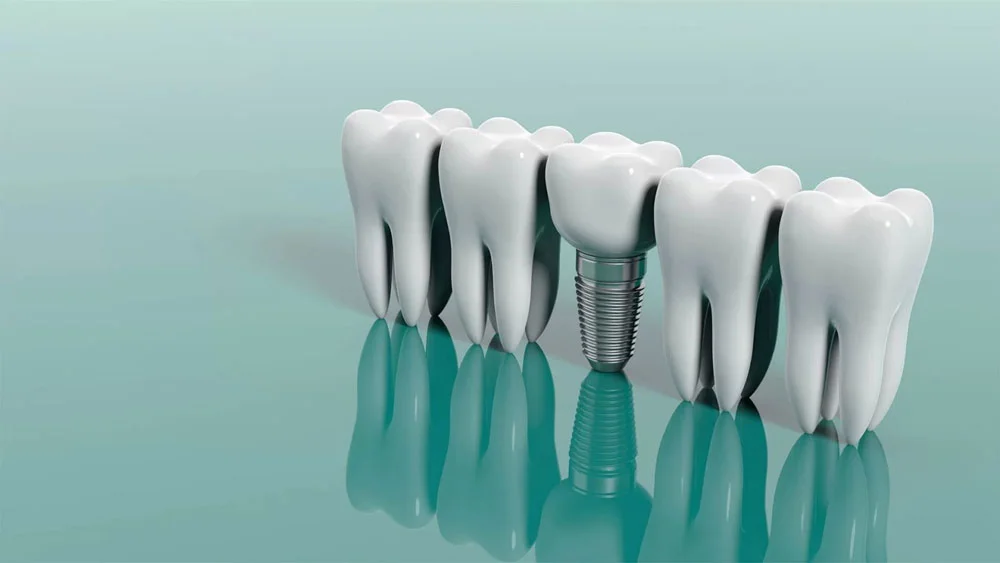
Implant Dental Treatment
What is a Dental Implant?
Dental implants are defined as artificial tooth roots that are placed in place of missing teeth. These implants are screws made of biologically compatible materials such as titanium. Dental implants are used by dentists in case of tooth loss and aim to replace the missing tooth and eliminate aesthetic and functional losses.
They are generally applied to the jawbone to replace teeth after tooth loss due to bone loss with advancing age, tooth decay and abrasion over time. Afterwards, teeth that can fulfill the chewing function are prepared on the implants.
Tooth deficiencies may be based on genetic reasons or may occur due to tooth fracture, decay and similar situations. The jawbone, which remains empty as a result of the loss of teeth, becomes thinner and may dissolve over time.
The main component of dental implants is a screw-like root piece made of materials such as titanium. This implant root is inserted into the jawbone and fuses with the bone over time, creating a solid foundation. On top of it, a prosthetic tooth or crown is placed to replace the tooth.
People do not feel any pain during the procedures performed under local anesthesia. After the implant is placed, a waiting period of 3 to 6 months may be required between the fusion of the bone and the implant. After the waiting period is completed, an impression is taken and a coating is placed on the implant.
How is Implant Treatment Performed?
Implant treatment techniques vary within themselves and the criteria here may be the bone structure of the patients, thickness, depth, proximity of the implant area to the nerves and sinuses. Considering all these parameters, the most appropriate technique is selected for the patients. Before the implant is applied, the general health status of the patients is evaluated and an intraoral examination is performed. Millimetric measurements are made on radiography and the length and diameter of the implant are decided.
After the preliminary planning is completed, the procedure is started under local anesthesia. After the implants are placed in the prepared gaps in the jawbone, the treatment is finished by suturing. One week after the operation, the stitches are removed and a control examination is performed, otherwise, only control is performed in seamless treatments.
What are the Advantages of Implant Dental Treatment?
Implants protect the health of the teeth and tissues, that is, in the absence of a single tooth, there is no need to erode the teeth around the extracted tooth. It increases the retention of the prosthesis of individuals using full dentures and reduces the movement of the prosthesis in the mouth.
The implant, which acts as a natural tooth root, increases the chewing force as a natural tooth. It can be applied to single or multiple teeth with the implant acting as a completely natural tooth.
After the implant is applied to the jawbone, a healing and bone fusion period is needed and this is 2-3 months for the lower jaw and 3-4 months for the upper jaw. After a while, the construction of teeth on the implants can begin.
Benefits of Dental Implants
- Dental implants offer a similar appearance to natural teeth, as they replace the missing tooth.
- Dental implants restore chewing function, making it easier to speak and eat. With good care and oral hygiene, they can be used for many years.
- While other treatment options may require cutting or damaging neighboring teeth, implants do not damage neighboring teeth.
- Dental implants stimulate the jawbone, preventing it from disappearing and preventing bone loss.
Dental implants are used to solve a person’s aesthetic and functional problems due to tooth deficiency or tooth loss. However, implant application should be evaluated by a dentist to determine whether it is a suitable option for the patient.
Implant treatment can vary depending on factors such as bone density and patient health. For suitable candidates, dental implants are a permanent and reliable option that effectively solves the problem of missing teeth.
How Long Does Implant Treatment Take?
The duration of the implant procedure varies according to the number of implants to be applied. The duration of implant treatment varies from patient to patient, and in some cases, the prosthesis stage can be started on the same day as the implant application, while in some patients, there may be an adaptation period due to additional surgical procedures. If additional procedures are applied in the presence of thin or insufficiently high bone, the waiting period is extended up to 6 months.